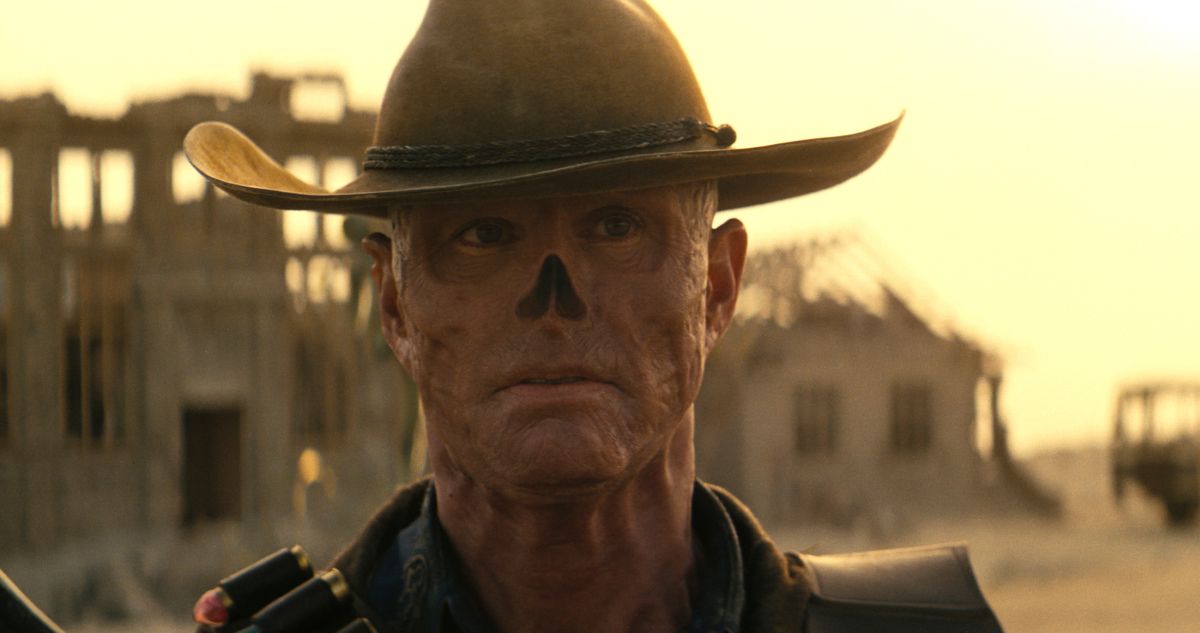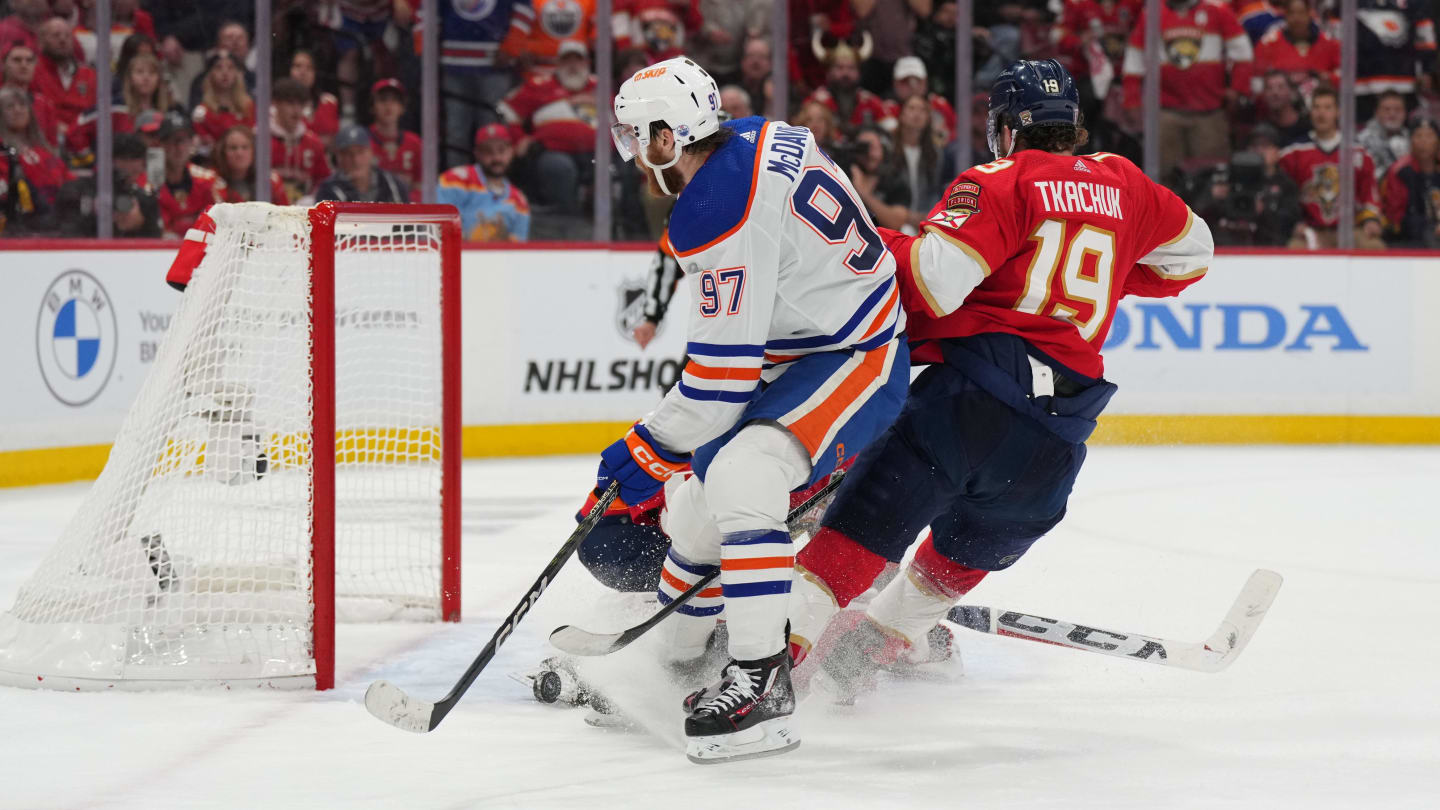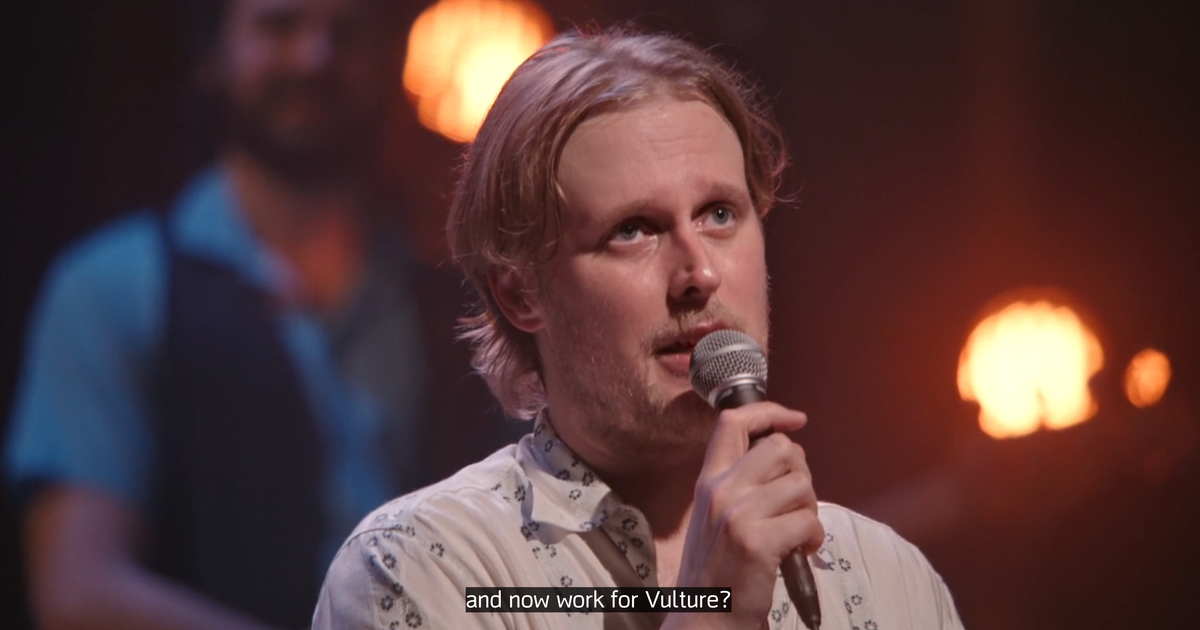Lisa Joy and Jonathan Nolan do love their tall dark strangers. In Westworld, the individual in question is Ed Harris’s Man in Black, a mysterious park patron who’s a swirl of menace and moody backstory. In Fallout, Prime Video’s new streaming adaptation of the popular Bethesda video-game franchise, those traits belong to The Ghoul, a noseless mutant played by Walton Goggins who haunts the postapocalyptic milieu in black western regalia. But the connective tissue between these two works extends far beyond killer cowboys: Both also share familiar interests in heady questions about constructed realities and the recurring patterns that doom humanity. Indeed, if you’ve been longing for the think-y futuristic noir of Westworld, which never got to conclude its story, Fallout will likely sate your appetite. Despite the source material, it’s basically Westworld 2.0.
Set in a retro-futurist America where pockets of survivors were driven into underground enclosures known as “vaults” after a nuclear holocaust, Fallout plays out its eight-episode season across several threads primarily anchored by three characters. There’s Lucy MacLean (Yellowjackets’ Ella Purnell), a doe-eyed vault dweller who decides to brave the surface after violent strangers invade her hermetically sealed society and abduct her father (Kyle MacLachlan). There’s Maximus (Aaron Clifton Moten), a sweet-natured young man who aspires to be a mech armor-wearing knight in a militaristic religious order known as the Brotherhood of Steel. And then, of course, there’s The Ghoul, who enters the story as a bounty hunter with mysterious but obviously destructive motives. As one would expect from the creators of Westworld, there’s additionally quite a bit more convolution layered onto the show’s plot structure. Left underground, Lucy’s meek brother, Norm (Moisés Arias), is compelled to pursue the truth behind the attack and, ultimately, their existence in the small network of partitioned vaults that’ve made up their world for centuries. Another story line takes place in the period before the bombs fell, where we follow an actor named Cooper Howard, who is the pre-mutated version of The Ghoul, as he’s slowly drawn into the world of Vault-Tec, the corporation responsible for conceiving the vaults in question.
Premiering its debut season in full tonight, Prime Video’s Fallout is stuffed to the gills with binge-friendly TV storytelling gambits like multiple timelines, rigorous world-building, and piles and piles of mystery boxes. You’ll even find a MacGuffin bringing together the three main characters in the form of a severed head that belongs to a whole other stranger, this one played by Michael Emerson, the patron saint of strangers. But Joy and Nolan’s production also turns out to be a remarkably effective video-game adaptation — perhaps the most dynamic of its kind. HBO’s The Last of Us garnered critical acclaim for its story and performances, but comparatively speaking, it didn’t have to do all that much in terms of actual adaptation since the original Naughty Dog game was, in many ways, constructed to be interactive prestige television from the outset. (Not to take too much away from the series, of course. Where showrunner Craig Mazin did invent new material, the results could be sublime.) The challenge with adapting Fallout lies in figuring out how to translate source material that’s as video-gamey as it gets: These are open-world titles where the story is emergent from the player’s interactions with a designed virtual world. Joy and Nolan’s approach is to synthesize large swathes of Fallout’s lore with their own thematic sensibilities, which turns out to be a productive pairing.
The universe of Fallout is a morose one, revolving around vaults that are revealed to be manufactured societies designed around different experiments. In the games, you might stumble upon a vault that seeks to re-create an agrarian society or establish a community defined by artistic pursuits, but more often than not, the conceits are infinitely stranger and darker. Keep wandering, and you’ll find a vault where all decisions are determined by chance. Another still is, uh, eugenics-forward. But aside from one that Lucy and Maximus stumble into later in the season, the Prime series doesn’t procedurally unveil a kaleidoscope of different vaults, instead running with them as an underlying motif to extract new layers within the preoccupations Joy and Nolan exhibited with Westworld. Here, once again, the duo entertain hefty queries about humanity and reality, but they also find new questions to play with. Namely, how does culture clash with individual morality? This theme is explored not just within the vault and postapocalyptic setting, sometimes in obvious ways, but also with the Cooper Howard flashbacks, through the more grounded framework of American hyper-capitalism. Frankly, the heady stuff works, which perhaps shouldn’t be too much of a surprise. Westworld was often noted for drawing on video-game logic and inspirations; now given an actual game to play with, Joy and Nolan possess the aura of nerds unleashed.
There’s a lot to recommend with Fallout. Ramin Djawadi’s score, which carries hints of Reznor and Ross, drones with excellence. Goggins, a preternaturally charismatic actor, eats every second he’s given with and without the nose. Purnell and Moten deliver fun performances as two innocents confronting a savage world, and there’s a real chemistry when they do get to share screen time. But not everything in this adaptation works. In its marketing push, Fallout has been billed as a raucous comedy, framing that is further supported by the showrunners; in an interview given a few years ago, Joy pitched the show as a “gonzo, crazy, funny adventure.” To be sure, the series does sorta-kinda believe this about itself. You can detect a slight touch of The Boys here, primarily in the form of the extreme gross-out gore — again, the MacGuffin is a literal severed head — and occasional juvenile bits that mostly track as frat-bro yucks. However, to call Fallout “comedic” is to either oversell the series’ sensibility or undersell the concept of funny. The comedic elements, even when featuring seasoned comedians like Chris Parnell (who appears as one-eyed vault dweller), often feel more like half-hearted ideas than actual bits.
On the other hand, humor is not really something one associates with Joy and Nolan, who are principally artists of cold cerebralism. To the extent there’s a genuine joke in Fallout, it’s the concept of humanity itself, which the show seems to view as self-defeating, laughable, and perhaps even pathetic. It’s noteworthy that the one character graced with any convincing dignity is Goggins’s Ghoul, who’s literally a mutant. This isn’t so much a critique as a plain observation of what seems to actually animate Joy and Nolan: portentously and sincerely asking whether human beings are worth the trouble. In Fallout, as in Westworld, they continue to seem unsure.















